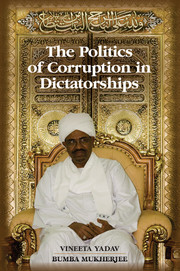Book contents
- Frontmatter
- Dedication
- Contents
- Tables
- Figures
- Acknowledgments
- 1 Introduction
- 2 Geographic Concentration and Political Mobilization by Small- and Medium-Sized Business Firms
- 3 SME Business Association, Multiparty Legislature, and Corruption
- 4 Geographic Concentration and National SME Association in Autocracies: The Empirical Evidence
- 5 Empirical Analysis of Legislative Institutions, SME Firms, and Corruption in Autocracies
- 6 Jordan: Institutional Change and Corruption
- 7 Malaysia: SME Mobilization and Corruption
- 8 Uganda: The Contrarian Case
- 9 Conclusion and Implications
- Appendix
- Bibliography
- Index
8 - Uganda: The Contrarian Case
Published online by Cambridge University Press: 18 December 2015
- Frontmatter
- Dedication
- Contents
- Tables
- Figures
- Acknowledgments
- 1 Introduction
- 2 Geographic Concentration and Political Mobilization by Small- and Medium-Sized Business Firms
- 3 SME Business Association, Multiparty Legislature, and Corruption
- 4 Geographic Concentration and National SME Association in Autocracies: The Empirical Evidence
- 5 Empirical Analysis of Legislative Institutions, SME Firms, and Corruption in Autocracies
- 6 Jordan: Institutional Change and Corruption
- 7 Malaysia: SME Mobilization and Corruption
- 8 Uganda: The Contrarian Case
- 9 Conclusion and Implications
- Appendix
- Bibliography
- Index
Summary
This chapter analyzes the Uganda case from 1986 to 2005. Uganda had neither an elected multiparty legislature with de facto opposition parties from 1986 to 2005, nor, because of low geographic concentration of domestic private SMEs in the country, a national private-sector SME association. Uganda thus provides the appropriate theoretical variation to study the politics of corruption in comparison to Jordan and Malaysia. The Uganda case is also employed to analyze whether the absence of the two conditions just mentioned led to high corruption levels in the country as hypothesized in the corollary to hypothesis 2.
We begin by presenting a brief overview of the political and economic history of Uganda. We then describe the features of domestic private-sector SME firms in Uganda and the geographic distribution of these firms. This is followed by a presentation of the qualitative and survey evidence on the attitudes of Ugandan private-sector SMEs toward corruption, and their preferred tactics for tackling corruption problems. We show that Ugandan SMEs have failed to form a national private-sector SME association even though these firms prefer mobilizing collectively on the issue of corruption through their own business association.
Next we discuss the state of opposition parties in Uganda from 1986, when the NRM assumed power under Yoweri Museveni, to 2005. From 2006 onward, Uganda has formally held multiparty elections after a referendum to introduce multiparty legislative elections was passed in 2005. Even though scholars continue to regard Uganda as effectively a one-party state after 2005, we conclude our analysis in 2005 in recognition of the formal change in rules. We build on this to show that the lack of an organized national SME association and the high payoffs of cooperating with the regime meant that opposition actors in Uganda had little incentive to form an alliance with private SME owners and exert anti-corruption pressure on the ruling elite. Consequently, Uganda's leaders have undertaken few genuine actions against corruption. Corruption levels have consequently remained persistently high in the country. Finally, we evaluate alternative hypotheses that may account for the high levels of corruption in Uganda.
A Brief Overview
The first post-independent government in Uganda was based on the parliamentary system and was elected in 1962 with Milton Obote becoming the prime minister. However, Obote expropriated power for himself in 1966, became president, subsequently suspended elections, and turned Uganda into a dictatorship.
- Type
- Chapter
- Information
- The Politics of Corruption in Dictatorships , pp. 214 - 244Publisher: Cambridge University PressPrint publication year: 2015

